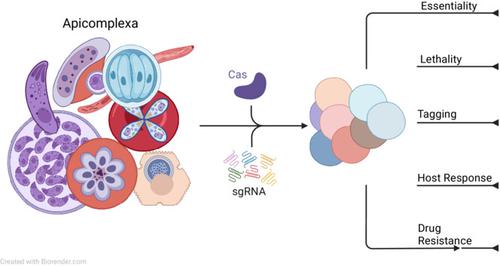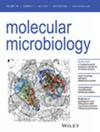通过全基因组 CRISPR 筛选了解表皮复合菌与宿主的相互作用。
IF 2.6
2区 生物学
Q3 BIOCHEMISTRY & MOLECULAR BIOLOGY
引用次数: 0
摘要
表皮复合寄生虫是人类和牲畜多种疾病的病原体。通过对这些寄生虫进行功能基因组学研究,可以确定生物机制和蛋白质功能,从而有针对性地进行治疗干预。最近,利用 CRISPR/Cas 技术改进了正向遗传学和全基因组筛选,彻底改变了对寄生虫感染宿主细胞过程中基因的功能分析。在此,我们将重点介绍CRISPR/Cas9筛选技术在表皮蠕虫或其感染的宿主细胞中的重要发现,并讨论如何最大限度地利用这项有助于回答寄生虫-宿主相互作用基本问题的技术所面临的挑战。本文章由计算机程序翻译,如有差异,请以英文原文为准。

Whole-genome CRISPR screens to understand Apicomplexan-host interactions.
Apicomplexan parasites are aetiological agents of numerous diseases in humans and livestock. Functional genomics studies in these parasites enable the identification of biological mechanisms and protein functions that can be targeted for therapeutic intervention. Recent improvements in forward genetics and whole-genome screens utilising CRISPR/Cas technology have revolutionised the functional analysis of genes during Apicomplexan infection of host cells. Here, we highlight key discoveries from CRISPR/Cas9 screens in Apicomplexa or their infected host cells and discuss remaining challenges to maximise this technology that may help answer fundamental questions about parasite-host interactions.
求助全文
通过发布文献求助,成功后即可免费获取论文全文。
去求助
来源期刊

Molecular Microbiology
生物-生化与分子生物学
CiteScore
7.20
自引率
5.60%
发文量
132
审稿时长
1.7 months
期刊介绍:
Molecular Microbiology, the leading primary journal in the microbial sciences, publishes molecular studies of Bacteria, Archaea, eukaryotic microorganisms, and their viruses.
Research papers should lead to a deeper understanding of the molecular principles underlying basic physiological processes or mechanisms. Appropriate topics include gene expression and regulation, pathogenicity and virulence, physiology and metabolism, synthesis of macromolecules (proteins, nucleic acids, lipids, polysaccharides, etc), cell biology and subcellular organization, membrane biogenesis and function, traffic and transport, cell-cell communication and signalling pathways, evolution and gene transfer. Articles focused on host responses (cellular or immunological) to pathogens or on microbial ecology should be directed to our sister journals Cellular Microbiology and Environmental Microbiology, respectively.
 求助内容:
求助内容: 应助结果提醒方式:
应助结果提醒方式:


